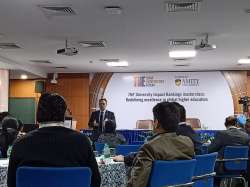Where do Indian universities stand in THE world rankings for UN SDGs
THE - Chief Knowledge Officer Phil Baty said that India’s participation has grown very rapidly in the global rankings’ arena

In March 2019, the government announced that the expenditure on education had gone up from 3.8 per cent of India's Gross Domestic Product (GDP) in 2014 to 4.6 per cent then.
The Centre ensured to prioritise the educational infrastructure in the coming years and to spend six per cent of the total GDP to improve educational facilities in India. Despite the impressive growth in the education budget, as the union HRD ministry claims, Indian institutions and universities still lag in various aspects such as the United Nations’ (UN) sustainable development goals (SDG).
In the Times Higher Education world university rankings, India stands at 56th position in terms of providing infrastructure, facilities, and knowledge to meet SDGs.
To discuss key challenges and opportunities faced by the universities in the subcontinent, Times Higher Education (THE) India Universities Forum, in partnership with Amity University, held a two-day forum at the university campus, As part of the programme, academicians, university leaders, and education specialists conducted an interactive session. The forum was organised on January 16 and 17.
This forum witnesses a host of national and international educators from higher education, industry and government come together and discuss the globalisation of higher education in India and its future.
THE - Chief Knowledge Officer Phil Baty held a data masterclass to explain the new rankings' methodology and presented insights into India's performance from the pilot results obtained by THE rankings, pioneered in 2019.
Baty said that India’s participation has grown very rapidly in the rankings’ arena.
THE University Impact Rankings are the world's first rankings to measure universities' social and economic impact, based on the United Nations' Sustainable Development Goals (SDGs).
These rankings recognise excellence in higher education not through traditional metrics such as research and prestige, but through an innovative range of performance indicators, looking at a university's stewardship of its resources, its outreach and research in specific fields relating to the SDGs and teaching the next generation to adopt sustainability in their lives.
“Over the last 3-4 years, India has dramatically improved its engagement in the global benchmarking and data analysis, which is a very positive sign as it ensures that Indian universities stay competitive,” said Baty.
“As a result, we are starting to build a really powerful picture of Indian higher education, but only at the research-intensive end. The universities should also focus on research in the arena of climate change to towards climbing up the global university rankings’ ladder,” added Baty.
Times Higher Education Regional Director (South Asia) Ritin Malhotra noted that a lot of Indian universities were engaged in interesting research work but needed to work on their communication skills to make that research count on the global stage.
Hiring Solutions Sales Executive at THE, Dipit Sharma, said that for building world-class faculties, universities need to think long term and understand and develop their university’s unique value proposition.
He also expressed concern how a lesser number of Indian students graduating to higher studies were preventing Indian universities from building world-class faculties. He noted that only 11.1 per cent of Indian youth had the opportunity to take up higher studies, compared to 20 per cent youth in China.
“With a shortage of resources creating a lack of funding and hampering research and with teachers and professors seeking opportunities overseas creating a shortage of skilled workforce, a lot needs to be done. We are losing the best of the minds to foreign countries who provide strong opportunities to grow,” said Dipit.
He stressed on the implementation of the National Education Policy 2019 that puts faculty back into the heart of higher education and also called for stopping the approach of ad-hoc and contractual appointments.
The Times Higher Education is set to organise Innovation and Impact Summit from April 22-24 in Stockholm, Sweden, where education specialists will discuss what makes a successful innovation climate.